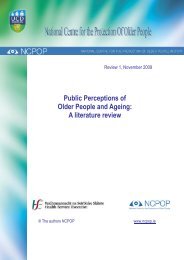Public Perceptions of Older People A literature review
Review 1 PP OP.pdf - National Centre for the Protection of Older ...
Review 1 PP OP.pdf - National Centre for the Protection of Older ...
You also want an ePaper? Increase the reach of your titles
YUMPU automatically turns print PDFs into web optimized ePapers that Google loves.
friendly society. As one ages, less respect is received from the public who do<br />
not recognise the contribution that many older adults are able to make to<br />
society (NCAOP 2005a).<br />
These findings are consistent with other studies, which have examined the<br />
position older people hold in society. For example, in the US, Cuddy et al.<br />
(2005) reported that older people were rated as having lower status than<br />
other societal groups. Furthermore, research by Arnold-Cathalifaud et al.<br />
(2008) reported that approximately half <strong>of</strong> a sample <strong>of</strong> young people viewed<br />
older people as passive rather than active citizens, suggesting that older<br />
people are not perceived as socially valued citizens in society.<br />
7.5.2 Summary<br />
This section examined the common stereotypes held <strong>of</strong> older people and<br />
ageing. A <strong>review</strong> <strong>of</strong> the <strong>literature</strong> suggests that older people are<br />
predominantly negatively perceived. Namely, older people are stereotyped<br />
as having poor health, as being unattractive, asexual and with a declining<br />
mental ability. <strong>Older</strong> people are also perceived as being conservative as<br />
well as being unhappy, lonely, isolated and overall undervalued by society.<br />
However evidence does exist to suggest that older people are perceived<br />
as being warm, dependable, content and active members <strong>of</strong> their<br />
communities.<br />
7.6 Factors that influence public perceptions <strong>of</strong> older people and<br />
ageing<br />
Numerous factors influence public perceptions <strong>of</strong> older people and ageing.<br />
This section examines the following factors: gender, age, knowledge and<br />
understanding, level <strong>of</strong> contact with older people, societal and cultural<br />
influences, modernisation and industrialisation, and the media.<br />
7.6.1 Gender<br />
7.6.1.1 Gender <strong>of</strong> the perceiver<br />
A person’s gender may influence how they perceive an older person. On<br />
average, men exhibit less favourable attitudes towards older people and fewer<br />
positive ageist behaviours than women (Bernardini Zambrini et al. 2008;<br />
Bodner & Lazar 2008; Cherry & Palmore 2008; Allan & Johnson 2009).<br />
However, not all studies support these findings (Arnold-Cathalifaud et al.<br />
21









